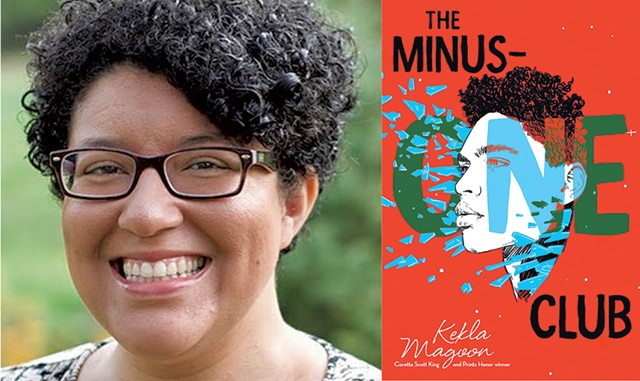
- Courtesy Of Alice Dodge
- Kekla Magoon
The title of Kekla Magoon's new novel, The Minus-One Club, refers to a wary and selective group of high school students who meet secretly, each having tragically lost someone.
Patrick's father disappeared in a sailing accident, and Celia's twin died of leukemia. Simon's only close relation was his grandfather, who had a fatal stroke. Janna's mom perished in a car accident while Janna was practicing driving, and Matthew lost his mother to pancreatic cancer.
Their club's rules are stoic and unbending:
1. Tell no one else about us.
2. We never talk about IT.
3. Ever.
4. Ever.
The unmentionable "IT" is death. This is a circle of survivors who've demarcated their allegiance to one another in a solidarity of silence.
As the story begins, Kermit Sanders is inducted into the club as a wounded newcomer. His sister Sheila was killed by a drunk driver. Kermit is in the stunned, almost speechless state of grieving, barely able to do more than show up for class, then retreating to the solace of his bed whenever he's at home.
Magoon, who lives in Montpelier, is the author of more than 20 books of fiction and nonfiction for children or teens, including 37 Things I Love (in No Particular Order), The Rock and the River, How It Went Down, and Revolution in Our Time: The Black Panther Party's Promise to the People, which was a National Book Award finalist, Los Angeles Times Book Prize finalist, Vermont Book Award finalist and Michael L. Printz Honor book. She received the 2021 Margaret A. Edwards Award from the American Library Association for her "significant and lasting contribution to young adult literature."
Magoon's plaudits also include a Boston Globe-Horn Book Award, an NAACP Image Award and four Coretta Scott King Honors. She has a BA from Northwestern University and an MFA in writing from Vermont College of Fine Arts, where she has taught in the Writing for Children & Young Adults program.
In 2022, she was awarded a Creation Grant from the Vermont Arts Council to work on "a memoir celebrating the non-romantic relationships that sustain a single adult."
A circle of grief-stricken teens is an anguished situation, and in The Minus-One Club, Magoon adds layers of further complications. Her narrator, Kermit, is a youth of color, which is subtly yet clearly indicated in a few places. More central to the story is his growing acknowledgement of his attraction to other boys, in particular his club-mate Matt, who is the single "out" gay person in their school. Kermit's parents are strict and devoted to their church, a congregation that explicitly condemns any lapse from strictly constrained sexual roles and propriety.
Matt challenges Kermit to be more self-accepting, to lower his guard and just be. But Matt's bold expression of his individuality comes with dangers: He is assaulted by bullies more than once in the locker room.
Matt has other challenges, using his bravado as a shield against unappeased shock and grief. He also has a drinking habit that Kermit comes to see as a barrier in their relationship and an obstacle to healing.
Magoon builds her story in highly concentrated scenes, mostly a page or less in length, with frequent chapter breaks that often occur in the middle of a continuing episode. Each chapter begins with a scrawled title ("Storage Closet Roulette," "God of Snacks," "Hammock") and a graphic of broken glass shards. This pacing keeps injecting fresh shots of impetus and intensity.
Some of the chapters are printed on pages with a gray background and white dots suggesting a starry sky. These describe dreams where Kermit's deceased sister, Sheila, appears, often in fanciful and thought-provoking scenarios. Through these reveries, the younger brother continues to draw guidance from his elder sibling.
In the dream, Sheila's sitting on a pillar, like a first-century ascetic monk ...
"Speak to me, O Wise One." How annoying, to have to refer to her as such.
She grins. Her eyes drift closed. She falls as still as her corpse was when I had to go and look at it in the funeral home. In the dream, she still looks like herself, though. Not painted fake and frozen. Not the freaky Sheila death mask that springs from the back of my mind like a jack-in-the-box...
In The Minus-One Club, Magoon delves into a remarkable range of knotty themes, any one of which might be enough for a less masterly writer. The novel probes the torments of grief, the exploration of sexuality and interpersonal violence, racial tension, deception as an expression of shame, alienation between parents and children, substance abuse, estrangement from traditional religion, and suicidal ideation.
Significantly, in a book that is extremely forthright about teenage trauma, Magoon keeps returning to the sanctity of friendship. The Minus-One Club provides support to its members, even on sudden notice. They respond like a fast squad when someone is in distress. Slowly they begin to consider adjusting the rules to allow for actually talking about their individual and shared pain.
Kermit is the quietest one, but as he learns to voice his thoughts and desires, he helps others approach greater openness and honesty.
For this reviewer, who is a long way from high school, Magoon's book brought back the social tumult and emotional chaos of life at that age. Any reader who knows and cares about young adults is likely to find this novel engrossing and heartrending, however far off youth might seem.
Teenage anguish is perpetual, but Magoon portrays difficulties of adolescence that seem specific to our time, as different ways of being become visible and viable. While adult society struggles to cope with change, younger people are taking the lead in mapping vast, maybe unforeseen territories of human feeling and possibility.
As an exceptional storyteller, Magoon shows how worn-out rules can be — must be — questioned, and how new forms of care in times of mourning must be celebrated.
From The Minus-One Club
I sigh myself awake.
Sheila used to like to rub her hands on the top of my head. Especially after a haircut. It drove me absolutely mad.
Our hair is different. Was. Her hair is long and soft and wavy. Was. Her hair was darker than mine, too, at least a little. That must be why she liked touching mine, which was textured instead of smooth. Close-cropped instead of long.
I would let her touch my head a thousand times a day, or kiss my cheeks, if she could only be not-dead again.
My door creaks open. "Morning, sweetie."
Mom shovels folded laundry out of the basket in the doorway and onto my rug. It softly plops in little piles that I won't ever put away, even though Mom is right now saying, "Put these away, okay?"
Mom doing laundry is far too normal. How is it that all the normal stuff just keeps happening?












Comments
Comments are closed.
From 2014-2020, Seven Days allowed readers to comment on all stories posted on our website. While we've appreciated the suggestions and insights, right now Seven Days is prioritizing our core mission — producing high-quality, responsible local journalism — over moderating online debates between readers.
To criticize, correct or praise our reporting, please send us a letter to the editor or send us a tip. We’ll check it out and report the results.
Online comments may return when we have better tech tools for managing them. Thanks for reading.